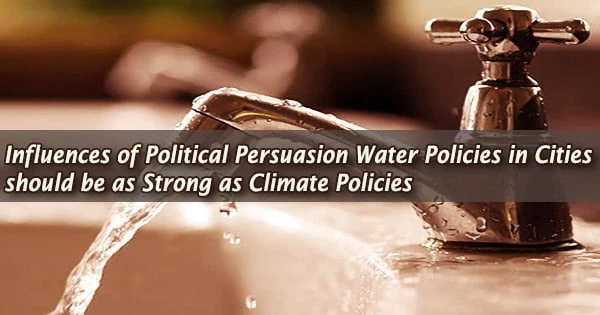A recent analysis shows that a city’s water rules are as much tied to whether it leans left or right as to whether the climate is rainy or dry, suggesting that urban water conservation measures reflect the nation’s political divide.
According to environmental researchers from Vanderbilt University, Los Angeles ranks first in terms of the quantity and strength of policies, followed by six other left-leaning California cities and Austin, Texas.
The study’s lead author, Jonathan Gilligan, associate professor of earth and environmental sciences, explained that finding a right-leaning community with strong water conservation policies takes until No. 8 because the quantity of water it can collect from the Edwards Aquifer is highly constrained.
“We were surprised by this finding. We had expected that water conservation would be a more neutral issue and less polarizing,” said Gilligan, who is also an associate professor of civil and environmental engineering. “As populations continue to grow and demands on water supplies increase, this information will be important for planning.”
The team discovered that cities that are less rich or conservative may consider offering refunds to encourage residents to install low-flow toilets and showerheads rather than requiring them.
“There’s plenty of water if we don’t waste it, and building aqueducts, pumps, desalination systems all of those are huge expensive energy-intensive things,” Gilligan said. “Water conservation is one of the best ways to make use of limited water supplies.”
Their findings were published in the journal Earth’s Future this month online and will be printed in a future print edition. Over the course of four years, the team looked at city water rules to compile a database of water-saving policies.
They also gathered data on the climate, water sources, population, economy, and political leanings of each city and its surrounding metropolitan statistical area as reflected in the 2008 and 2012 presidential elections, as well as an associated index of the number of different categories of policies each city adopted.
There’s plenty of water if we don’t waste it, and building aqueducts, pumps, desalination systems all of those are huge expensive energy-intensive things. Water conservation is one of the best ways to make use of limited water supplies.
Jonathan Gilligan
They designed an interactive map that allows people to see where their cities rank in the world. Here are the top 20 water policies, according by the number of policies. Only three Republican leaners are shown in parenthesis:
Los Angeles, CA
San Diego, CA
Santa Rosa, CA
Oxnard, CA
San Jose, CA
Santa Cruz, CA
Austin, TX
San Antonio, TX (R)
Albuquerque, NM
Riverside, CA (R)
Fresno, CA (R)
Denver, CO
San Francisco, CA
Las Vegas, NV
Salinas, CA
El Paso, TX
Miami, FL
Fort Collins, CO
Stockton, CA
New York, NY
Salt Lake City, UT
Tampa, FL
Vallejo, CA
Based on a statistical examination of their politics, climate, and economy, they also developed a list of cities whose conservation measures were much stronger or weaker than expected.
The table below ranks cities according to how far they deviated from expectations, then lists whether they lean more Democratic or Republican than the national average, their rank for number of water conservation policies, and their expected rank in parenthesis.
San Antonio, TX (R, No. 8, expected No. 32)
McAllen, TX (D, No. 90, expected No. 29)
Oxnard, CA (D, No. 4, expected No. 18)
Austin, TX (D, No. 7, expected No. 23)
Santa Maria, CA (D, No. 49, expected No. 14)
San Diego, CA (D, No. 2, expected No. 7)
Santa Rosa, CA (D, No. 3, expected No. 10)
College Station, TX (R, No. 29, expected No. 76)
Phoenix, AZ (R, No. 57, expected No. 24)
Houston, TX (R, No. 71, expected No. 31)
Other authors on the study were graduate students Christopher A. Wold, Scott C. Worland, and John J. Nay, all of whom were affiliated with the Vanderbilt Institute for Energy and Environment during the research; David J. Hess, professor of sociology and James Thornton Fant Professor of Sustainability Studies; and George M. Hornberger, University Distinguished Professor of Civil and Environmental Engineering and Earth and Environmental Sciences, Craig E. Philip Professor of Engineering and director of the Vanderbilt Institute for Energy and Environment.
















